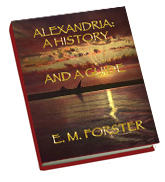E.M. Forster’s
ALEXANDRIA: A HISTORY AND GUIDE

Excerpts
from CLEOPATRA
Back in Alexandria again, [Cleopatra] watched the second duel—that between Mark Antony and
Caesar’s murderers. She helped neither party, and when Antony won he summoned her. She came, not
in a carpet but in a gilded barge, and her life henceforward belongs less to history than to poetry.
Voluptuous but watchful, she treated her new lover as she had treated her old. She never bored him,
and since grossness means monotony she sharpened his mind to those more delicate delights, where
sense verges into spirit. Her infinite variety lay in that. She was the last of a secluded and subtle race,
she was a flower that Alexandria had taken three hundred years to produce and that eternity cannot
wither…
Back to the top.
from LITERATURE
History is too much an affair of armies and kings. Theocritus’ Fifteenth Idyll corrects the error. Only
through literature can the past be recovered, and here Theocritus—wielding the double spell of realism and
of poetry—has evoked an entire city from the dead and filled its streets with men. As Praxinoe remarks of
the draperies ‘Why the figures seem to rise and move about, they are not patterns, they are alive.’
Back to the top.
from THE ARAB CONQUEST (641)
The following year Amr entered in triumph through the Gate of the Sun that closed the eastern end of the
Canopic Way. Little had been ruined so far. Colonnades of marble stretched before him, the Tomb of
Alexander rose to his left, the Pharos to his right. His sensitive and generous soul may have been moved, but
the message he sent to the Caliph in Arabia is sufficiently prosaic. He writes: ‘I have taken a city of which I
can only say that it contains 4,000 palaces, 4,000 baths, 400 theatres, 1,200 greengrocers and 40,000 Jews.’ And
the Caliph received the news with equal calm, merely rewarding the messenger with a meal of bread and oil
and a few dates. There was nothing studied in this indifference. The Arabs could not realise the value of
their prize. They knew that Allah had given them a large and strong city. They could not know that there was
no other like it in the world, that the science of Greece had planned it, that it had been the intellectual
birthplace of Christianity. Legends of a dim Alexander, a dimmer Cleopatra, might move in their minds, but
they had not the historical sense, they could never realise what had happened on this spot nor how
inevitably the city of the double harbour should have arisen between the lake and the sea. And so though
they had no intention of destroying her, they destroyed her as a child might a watch. She never functioned
again for over 1,000 years.
Back to the top.
from ISLAM
We have now seen Alexandria handle one after another the systems that entered her walls. The ancient religion
of the Hebrews, the philosophy of Plato, the new faith out of Galilee—taking each in turn she has left her
impress upon it, and extracted some answer to her question, ‘How can the human be linked to the divine?’
It may be argued that this question must be asked by all who have the religious sense, and that there is nothing
specifically Alexandrian about it. But no; the question need not be asked; indeed, it was never asked by Islam,
by the faith that swept the city physically and spiritually into the sea. ‘There is no God but God, and
Mohammed is the Prophet of God,’ says Islam, proclaiming the needlessness of a mediator; the man Mohammed
has been chosen to tell us what God is like and what he wishes, and therein ends all machinery, leaving us to
face our Creator. We face him as a God of power, who may temper his justice with mercy, but who does not
stoop to the weakness of Love, and we are well content that, being powerful, he shall be far away. That old
dilemma, that God ought at the same time to be far away and yet close at hand, cannot occur to an
orthodox Mohammedan. It occurs to those who require God to be loving as well as powerful, to Christianity
and its kindred growths, and it is the weakness and the strength of Alexandria to have solved it by the
conception of a link. Her weakness: because she had always to be shifting the link up and down—if she got
the link too near to God, it became too far from man, and vice versa. Her strength: because she did cling to the
idea of Love, and much philosophic absurdity—much theological aridity—must be pardoned to those who
maintain that the best thing on earth is likely to be the best in heaven.
Back to the top.
from NAPOLEON (1798-1801)
On July 1st 1798 the inhabitants of the obscure town saw that the deserted sea was covered with an
immense fleet. Three hundred sailing ships came out from the west to anchor off Marabout Island, men
disembarked all night and by the middle of next day 5,000 French soldiers under Napoleon had occupied
the place. They were part of a larger force, and had come under the pretence of helping Turkey, against
whom Egypt was then having one of her feeble and periodic revolts. The future Emperor was still a mere
general of the French Republic, but already an influence on politics, and this expedition was his own plan.
He was in love with the East just then: The romance of the Nile valley had touched his imagination, and
he knew the way led to an even greater romance—India. At war with England, he saw himself gaining at
England’s expense an Oriental realm and reviving the power of Alexander the Great. In him, as in Mark
Antony, Alexandria nourished imperial dreams. The expedition failed but its memory remained with him:
he had touched the East, nursery of kings.
Back to the top.
from PHAROS
The lighthouse took its name from Pharos Island (hence the French ‘phare’ and the Italian ‘faro’).
No doubt it entered into Alexander the Great’s scheme for his maritime capital, but the work was not
done till the reign of Ptolemy Philadelphus. Probable date of dedication: B.C. 279, when the king held a
festival to commemorate his parents. Architect: Sostratus, an Asiatic Greek. The sensation it caused was
tremendous. It appealed both to the sense of beauty and to the taste for science—an appeal typical of the
age. Poets and engineers combined to praise it. Just as the Parthenon had been identified with Athens
and St. Peter’s was to be identified with Rome, so, to the imagination of contemporaries, the Pharos
became Alexandria and Alexandria became the Pharos. Never, in the history of architecture, has a secular
building been thus worshipped and taken on a spiritual life of its own. It beaconed to the imagination, not
only to ships at sea, and long after its light was extinguished memories of it glowed in the minds of men.
Back to the top.
|



